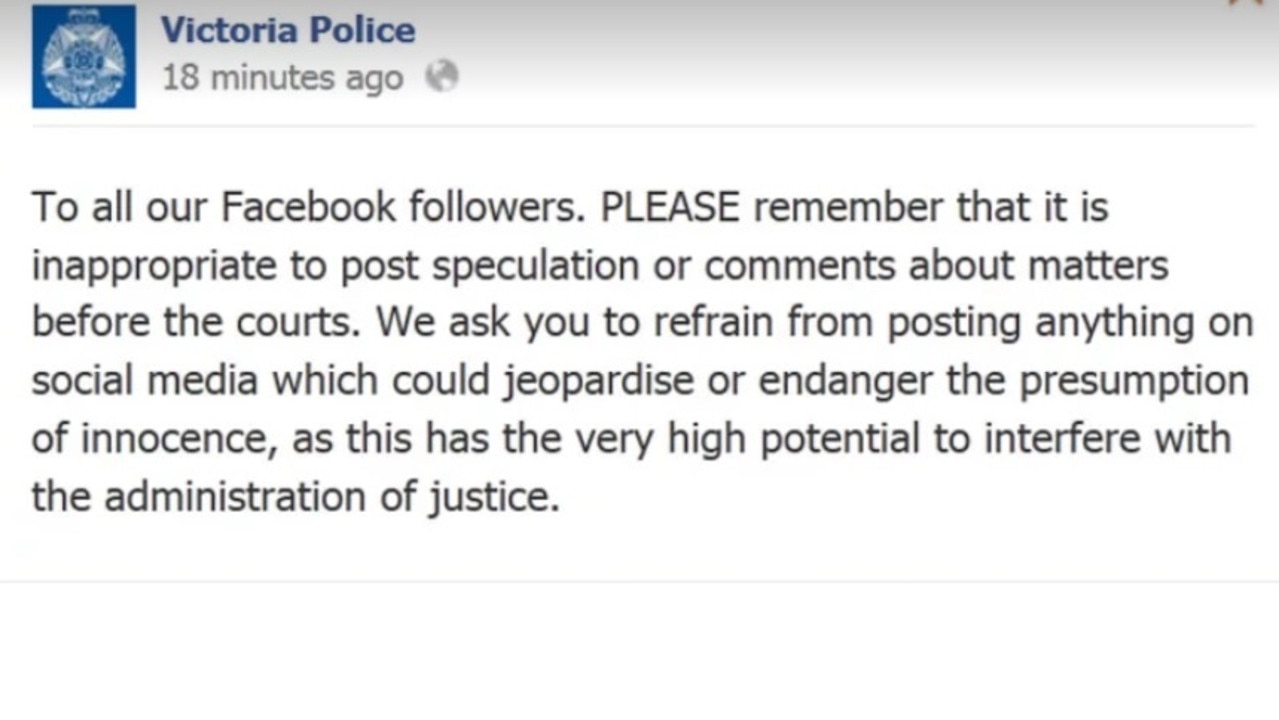Experts warn online vigilantes not to share photos of people accused of crimes
AUSTRALIA was rocked by three shocking crimes last week, and the public wants justice. But posts like these do the exact opposite.
AUSTRALIANS are furious. As a country, we’re reeling from three horrific crimes occurring within days of each other — crimes which have left two young women dead and a young child’s life altered forever.
Last Tuesday, 22-year-old budding comedian Eurydice Dixon’s promising life was cut short when she was stalked, raped and murdered as she walked home from a gig in Melbourne.
On the same day Ms Dixon was killed, an 11-year-old girl was snatched on her way to primary school in Newcastle before being sexually assaulted for hours on end.
And the following day, a 19-year-old man was charged with the murder of his flatmate, 28-year-old Sydney woman Qi Yu, who had been missing for many days.
• How Ivanka made her millions
• How I ditched the ‘nine-to-five’ grind
• Sneaky trick young Aussies are ditching
When we hear stories like these, it makes us feel angry, and it makes us feel helpless.
It’s tempting, then, to feel like we can fight back against the gross injustice in some small way, by sharing photos of the people accused of these heinous crimes online, in an effort to “name and shame” them.
After all, the media is blurring their faces! Journalists aren’t reporting their names — and something has to be done, right?
With the click of a button, photos of the accused accompanied by accusations and speculation can be spread around the world — but while it can be satisfying to feel you are seeking justice, you could actually be doing the complete opposite.
In October 2016, The Conversation published a piece on why “trial by social media” can be such a problem for the criminal justice system.
As senior criminology lecturers Alyce McGovern and Sanja Milivojevic explained in the piece, sharing photos and speculation online could impact the accused’s right to a fair trial — which could ultimately lead to a lighter sentence or even a mistrial, which could see an offender walk free.
“Activity on Facebook and Twitter can pose a threat to prosecutions and the right to a fair trial through practices such as sharing photos of the accused before an indictment, creation of hate groups, or jurors sharing their thoughts about a case online,” they wrote.
“In the Meagher case, Victoria Police used its Facebook page to educate the public about the consequences of such breaches. In addition, a web gag on social media was imposed by a magistrate who suppressed the information that might compromise the trial.”

When the media blurs the face of someone accused of a crime or avoids naming them, it’s not because of some big conspiracy to protect them.
It’s because in Australia, we have the right to the presumption of innocence, and to a fair trial.
If that’s compromised — through media reports, or social media posts — there can be serious consequences.
NSW Police declined to comment for this story, but Crime Manager with the Newcastle Local Area Command, Detective Inspector Steve Laksa, told news.com.au the public should always think twice before sharing posts relating to crimes on social media.
He said it was due to the potential of “prejudicing judicial processes” as well as compromising the safety of the accused.
Sydney barrister Bridie Nolan agreed that social media was a “confronting issue” in the courtroom.
“Jurors are required to take an oath to decide the case solely upon the evidence presented in the courtroom and upon the basis of the legal directions given by the judge,” she said.
“This specifically precludes jurors researching the issues arising in the case online or taking into account anything they may hear outside of the courtroom.”
Ms Nolan said in cases where courts detect instances of inappropriate social media use by jurors, they may elect to dismiss the juror or jury panel, or find the juror guilty of an offence.
She said the court can also adjourn a trial or grant a stay of the prosecution because of adverse media publicity.
“ … the court proceeds on the basis that the jurors will act in accordance with their oaths and directions given against being prejudiced by media publicity and opinions disseminated in social media,” Ms Nolan said.
“A stay will only be granted where no action can be taken by the judge to overcome any unfairness due to publicity taking into account the public interest in the trial of persons charged with serious offences.”
But Tom Meagher, the husband of slain Jill Meagher, might have summed it up best when he made a public plea regarding social media posts in 2012.
“While I appreciate all the support, I would just like to mention that negative comments on social media may hurt legal proceedings, so please be mindful of that,” he said — advice which unfortunately is still relevant today.



